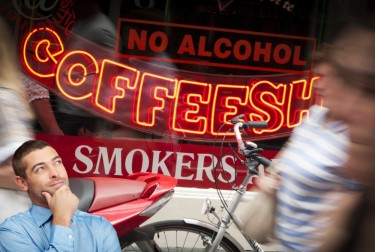
Let’s Grow Dutch – Will Amsterdam’s Coffeeshops Survive European Cannabis Legalization?
If the dilemmas of figuring out how to legally certify a marijuana market in the United States and Canada were filled with drama, the problems in the European market will be no less severe.
At the moment in Germany, the entire debate is on hold on various excuses, some of which are the ongoing pandemic, if not the war in Ukraine, despite the constant clamor about its inevitability.
The founders of the eponymous coffee shop, the Dutch living just across the Schengen border, are currently beginning to experience their growing pains as they discuss the creation of a legal, authorised, national market.
WHAT ARE COFFEE SHOPS?
In the Netherlands, coffee shops are places where the sale of cannabis for personal use is permitted by local authorities. They are also known as cannabis stores.
The sale of cannabis products in small quantities is allowed by licensed coffeeshops according to the Dutch drug policy. Drinks and meals are available at most of these establishments. Coffee shops are not licensed to serve alcohol or other drugs, and if caught selling soft drugs, hard drugs, or alcohol to minors, they risk being shut down.
HOW THE NETHERLANDS TRY TO MAINTAIN ITS NATIONAL INDUSTRY
The cannabis stores that operate in the biggest cities will still own unauthorized home-grown. Aside from these stories, however, the Dutch government has created a national cultivation offer to supply ten cities that have regulated cannabis. This program is still in the testing phase. It also looks at how the idea works and what impact it is having on the general population and their ability to prevent cannabis from getting into the hands of teenagers and children.
The test program is scheduled to start next year. At this point, the marijuana grown during the trial period is then shipped to these various facilities, and all cannabis stores located in a participating city must purchase their marijuana from the state-certified program. They risk losing their license if they don’t purchase cannabis from the program. However, this does not mean that cannabis shops cannot buy from other growers.
The market is supplied by ten growers who have won the right to participate in a cultivation tender. Although at this point only seven growers have qualified to take part. Growers must be able to demonstrate that they have no history of violating the law and can maintain their growing facilities.
The centralization of the cannabis business makes cannabis shop owners in these locations not very eager. Many people doubt that the quality of the cannabis they will receive from these breeders will not match what they previously produced, which will definitely limit the choice of marijuana on offer. This issue has yet to be considered by the government.
Once the trial begins, cannabis stores in those cities will only have six weeks to sell all of their home-grown cannabis they might have. At this point, they become obligated to buy from growers under the government program.
Many shop owners want more freedom of choice. Many people believe that there should be voluntary consent rather than a mandatory obligation.
However, the option they proposed was not granted to them by the Dutch government. Because of this, many cannabis stores fear losing customers to the existing black market.
GROWING PAIN
The Dutch government launched a national trials program in late 2019 to manage the entire recreational marijuana supply chain. Since then, a legal tender has been held to select the breeders who are allowed to grow such marijuana.
The test program is designed to last four years. Several delays have hampered the process, including NIMBY complaints from cities protesting such cultivation in their counties, and even a clout lawsuit filed by a major Canadian grower.
During the experiment, the researchers will monitor the entire process. Depending on the results of the trial, the government will decide how to implement the policy effectively in the long term.
As it currently stands Dutch cannabis shops grow their own cannabis and as such the whole process is in a gray area of the law. This will not stop once national trials begin. Cannabis shops in the larger cities will continue to grow their cannabis.
This process is also taking place in the context of increasing pressure on existing cannabis outlets, which typically includes warnings from government agencies to ban tourists from buying or visiting such establishments.
WILL OTHER EUROPEAN COUNTRIES FOLLOW IN THE STEPS OF THE DUTCH?
Much attention is paid to the course of the Dutch process outside the Netherlands. This is especially true in Germany, which is now struggling to find a way to make its leisure system work. Although Germany may not allow establishments such as coffee shops to operate, at least initially, they would be more apt to set up a similar controlled cultivation system if they did not mandate that the top three medicinal growers be the main suppliers of the same.
Still, there’s no doubt that Europe is on the verge of finally acknowledging the fact that cannabis is here to stay.
FINAL EFFECT
The goal of the trial program is to determine with certainty whether it will be possible to tamper with a quality-controlled supply of cannabis to coffeeshops and to study the impact of a tampered supply chain on safety, crime, public health and public harassment.
AMSTERDAM AND THE LIFE OF CANNABIS, READ MORE…

IF AMSTERDAM COFFEE SHOPS CLOSES, WHO WILL BE THE NEW WEED CAPITAL OF EUROPE?
OR..

ARE DUTCH COFFEE SHOPS REALLY CLOSING IN AMSTERDAM?

Post a comment: